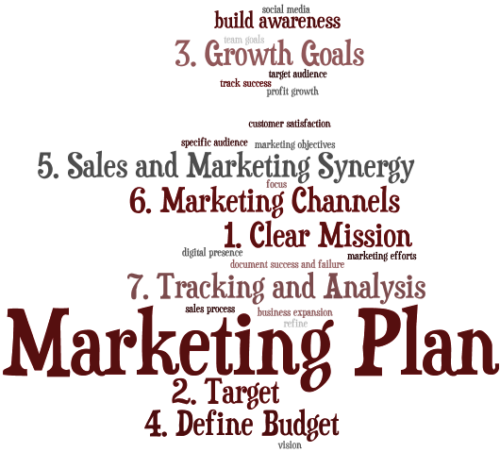
Marketing strategy should be applied consistently over time for success.
The Internet and technology have changed customers’ marketing interactions with businesses. Following are seven core elements of a successful marketing plan that can survive the ever-changing world of marketing channels and technology:
1) Answer the question ‘Who are we as an organization?’
Provide a clear mission, vision for the future, friendly culture, and ¹competitive analysis. Create a plan that is authentic and inspires customer loyalty.
2) Target your buyer/customer.
Speak to a specific audience: communicate who you are and what you’re hoping to promote, frequently. The narrower the focus, the more effective your marketing spend.
3) Outline big-picture growth goals and define marketing objectives.
Focus on business expansion, profit growth and customer satisfaction. ¹Provide a tactical timeline for planned actions (ex: “what by when”).
4) Define and segment your budget into three core categories.
Split your budget into three core marketing buckets: building and maintaining awareness, maintaining an internet/mobile presence, and utilizing social media. Allocate for upcoming projects and/or those already in progress.
5) Set expectations for how sales and marketing will work together.
Document a sales process for each product/service line. Outline team goals and have a plan for tracking success. Ensure constant communication between the teams. Provide a process for how a lead is transferred from marketing to sales.
6) Provide rules for how to select your marketing channels.
All marketing platforms should be considered by your target audience. Outline how often to review/refine your marketing channels.
7) Detail a marketing tracking and analysis plan.
Track your marketing efforts and key performance metrics. Review who it will be reported to, communicate any changes with your teams, and document last year’s successes and failures.
While the strategy may be done on an annual/periodic basis, the tactics that support the strategy should be reviewed and revised in real time. Strategic planning is a big-picture, long-term activity and a marketing strategy should be applied consistently over time for success.²
Source: Lauren Davenport, CEO-The Symphony Agency; ¹Ford Kanzler, Managing Partner-Marketing/PR Savvy; ²Christine R. Valeriann-MarketingProfs
